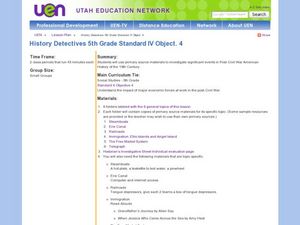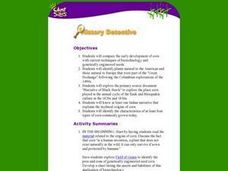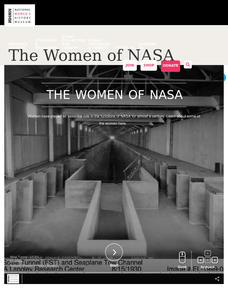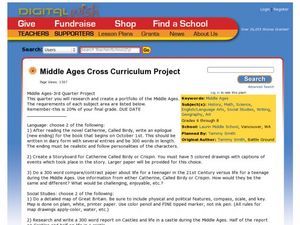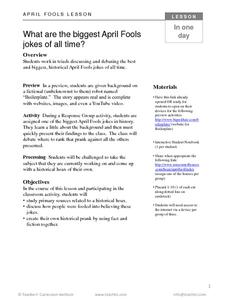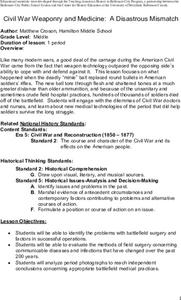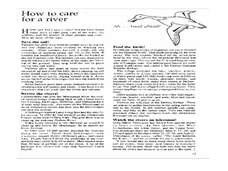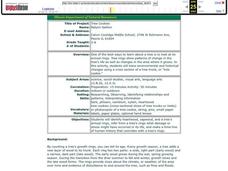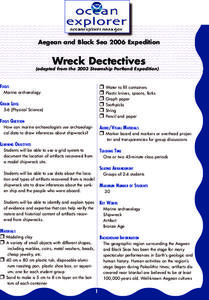Curated OER
Women's History Week
Learners investigate the contributions of women who influenced human rights in US history. They examine the influence Susan B. Anthony, Harriet Tubman, Sojourner Truth and Elizabeth Cady Stanton by participating in a jigsaw activity....
Curated OER
The Ruins of Pompeii: A Window into History
Sixth graders research the history of Pompeii and its destruction. Locate important geographical features of Rome. Gain insight into the past through archaeological interpretation. Synthesize historical information through imaginative...
Curated OER
History of the X-Ray
Seventh graders discuss the history of the x-ray machine. In this social science lesson, 7th graders understand how a x-ray machine works. Students recognize that there have been many improvements to the x-ray machine over the...
Curated OER
History o the Husky
Students discuss the types of dogs used in dog sledding. In this social science lesson, students define mushing and begin to understand what the Iditarod race is. Students also explore how to take care of the dogs.
Curated OER
Sky Watching
Students complete night-sky observations to understand how our knowledge of the sky has been enhanced by telescopes. Students complete a timeline worksheet giving the history of telescopes. Students then then make their own observations...
Curated OER
Bhopal Gas Tragedy
Useful as a model for an individual research presentation, these slides cover the Bhopal Gas disaster. Information cited includes data about the hazard rating of the chemical as well as the health effects of the dumping. Both science and...
Curated OER
History at Work
Students study the history of farm machinery with a focus on farming in Ireland. In this farming history lesson plan, students study a picture of a farm object from the early twentieth century and complete a worksheet about the picture....
Curated OER
Do Some Research - The Telephone
In this telephone research worksheet, students research the meaning, history and science of the telephone. Students answer four questions about the telephone, and then write an additional piece of information about telephones.
Curated OER
Post-Civil War American History
Fifth graders examine significant events in Post-Civil War America. In this Post-Civil War lesson, 5th graders investigate the important events after the war in 19th century America. They read primary source documents about six topics...
Curated OER
History Detective
Middle schoolers study the effects of the Great Exchange on the Americas.
National Woman's History Museum
The Women of NASA
Human computers? Although it may sound like science fiction, the term was used to describe the women who made the NASA calculations before the advent of electronic computers. A 21-slide presentation introduces viewers to the women who...
Teach Engineering
Airplanes Everywhere: Land! Water! Sky! Oh, My!
How important is aviation? Using the background information, teachers provide the class with a brief history of aviation. The class discusses how airplanes are important to the area of transportation in the 17th installment of a...
Curated OER
Middle Ages Cross Curriculum Project
Middle schoolers complete several projects on the Middle Ages. In this world history lesson, students complete language arts, social studies, math, and science projects. Some of these include: comparing a teenager's life now to that in...
TCI
What Are the Biggest April Fools Jokes of All Time?
After working in groups to analyze primary sources related to a historical hoax, learners will discuss how people managed to be fooled and work to identify one of the biggest April Fools jokes in history.
The New York Times
Investigating the Heroin and Prescription Opioid Epidemic
How bad is the opioid crisis in America? Has it gotten worse in the last few decades? Why? High schoolers delve into these questions with a thorough and thoughtful lesson from The New York Times on heroin prescription opioids....
Constitutional Rights Foundation
Why Don’t More People in the U.S. Vote?
To vote or not to vote, that is the question. Secondary scholars explore voter turnout in the United States. The resource uses informational text, group discussion, and a worksheet to help academics understand hindrances to voting...
Constitutional Rights Foundation
Suppressing the Vote
Voting rights have expanded over time, but some voters are still being suppressed. A thought-provoking resource explores the history of voter suppression in the US and efforts to remove roadblocks to voting. Young historians learn about...
Council for Economic Education
Why Didn't China Discover the New World?
Who was Zheng He and why haven't we heard of him? Scholars consider the question as they compare his vast expeditionary force to that of Christopher Columbus. Young historians then ponder the intersection of science, economics, and...
Constitutional Rights Foundation
Putin's Illiberal Democracy
Is Russia really a democracy? High school scholars explore Russian democracy under the leadership of President Putin. The resource provides opportunity for group discussion, writing, and research to understand Russia's political history,...
Center for History Education
Civil War Weaponry and Medicine: A Disastrous Mismatch
Ironically, science was the reason why the Civil War was so deadly. Despite the use of medical practices now considered barbaric—such as conducting surgery with bare, dirty hands—developments in weaponry meant that more men died on and...
Curated OER
Urban Ecosystems 2: Why are There Cities? A Historical Perspective
Second in a series of five lessons, this lesson plan encourages preteens to consider cities as urban ecosystems. First, they keep a food diary for a few days. They visit the Natrional Agricultural Statistics Service website for current...
Curated OER
The Delicate Balance - Iowa's Natural Resources
Discover the natural resources in Iowa by studying it's history. For this environmental lesson, your students will observe a topographical map of Iowa and identify where its most valuable resources are. They complete an Iowa name...
Curated OER
Tree Cookies
Students identify heartwood, sapwood, and a tree's annual rings, infer from a tree's rings what damage or stress might have occurred in its life, and make a time-line of human history that coincides with a tree's rings.
Curated OER
Wreck Detectives
Junior archaeologists examine types of artifacts from the Bronze Age on the internet. In collaborative groups, they create a story about a ship from this period and then construct a model of the ocean floor after their ship has sunk....
Other popular searches
- History of Science Museums
- The History of Science
- History of Science Nuclear
- History of Science Physics
- History of Science Georges
- Ancient Science Inventions
- History and Science Fiction
- Computer Science History
- Brief History of Science
- Ancient Maya Science
- Science History
- "History of Science Museums








